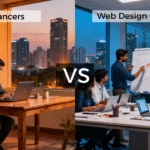When it comes to building a successful online presence, two essential components play a crucial role: web design and web development. While these terms are often used interchangeably, they are distinct disciplines that contribute to the overall creation and functionality of a website. As a leading website development company in Bangalore, we aim to clarify the differences between web design and web development to help businesses make informed decisions about their digital strategy.
Understanding Web Design
Web design focuses on the visual aesthetics and user experience (UX) of a website. It involves designing the layout, color scheme, typography, and overall appearance to create an appealing and engaging user interface (UI). A well-designed website ensures seamless navigation, accessibility, and brand consistency.
Key Aspects of Web Design
- User Interface (UI) Design – Creating visually appealing and intuitive interfaces that enhance user interactions.
- User Experience (UX) Design – Ensuring smooth navigation and a positive experience for visitors.
- Responsive Design – Optimizing the website for various screen sizes and devices.
- Branding and Aesthetics – Maintaining brand identity through color schemes, fonts, and imagery.
- Wireframing and Prototyping – Designing website layouts and testing prototypes before development.
Tools Used in Web Design
- Adobe XD
- Figma
- Sketch
- Photoshop
- Canva
A well-structured web design lays the foundation for a functional and visually compelling website. Businesses seeking professional web design services in Bangalore should consider working with experienced designers who understand both aesthetics and user behavior.
Understanding Web Development
Web development focuses on the technical aspects of building a website, ensuring its functionality, speed, and security. Web developers use programming languages and frameworks to transform a web design into a fully functional site.
Types of Web Development
- Front-End Development – Involves coding the visible elements of a website using HTML, CSS, and JavaScript.
- Back-End Development – Focuses on server-side programming, database management, and website functionality.
- Full-Stack Development – Combines both front-end and back-end development skills.
- E-commerce Development – Creating online stores with secure payment gateways and shopping cart functionality.
- Content Management System (CMS) Development – Building websites using platforms like WordPress, Joomla, or Drupal.
Common Web Development Technologies
- HTML, CSS, JavaScript
- React, Angular, Vue.js
- PHP, Python, Node.js
- WordPress, Shopify, Magento
- MySQL, MongoDB, PostgreSQL
For businesses seeking reliable web development services in Bangalore, choosing an experienced website development company in Bangalore ensures a seamless and scalable website solution.
Key Differences Between Web Design and Web Development
| Feature | Web Design | Web Development |
| Focus | Visual appeal & user experience | Functionality & website performance |
| Tools | Figma, Adobe XD, Photoshop | HTML, CSS, JavaScript, Python, PHP |
| Responsibilities | Layout, typography, branding | Backend logic, database management |
| Outcome | Aesthetic, user-friendly website | Fully functional, interactive site |
How Web Design and Web Development Work Together
Web design and web development go hand in hand to create a successful website. Designers create the blueprint and layout, while developers bring it to life by coding and implementing functionality. A well-designed website with poor development can result in slow loading speeds, security vulnerabilities, and a lack of interactivity. Similarly, a well-developed website with poor design can drive users away due to a bad user experience.
As a trusted website development company in Bangalore, we integrate both web design and web development to deliver high-quality websites that are visually appealing, functional, and optimized for performance.
Why Choose a Professional Website Development Company in Bangalore?
Whether you need a new website or want to revamp your existing one, working with a web development company in Bangalore ensures expertise, innovation, and tailored solutions. Here’s why businesses should seek professional help:
- Custom Web Solutions – Get a website tailored to your business needs and industry trends.
- SEO-Friendly Design – Optimize your website for search engines to enhance visibility.
- Scalability & Performance – Ensure your website can grow with your business.
- Security & Reliability – Implement best practices to safeguard against cyber threats.
- Seamless User Experience – Create an engaging and intuitive website that keeps users engaged.
Conclusion
Understanding the difference between web design and web development is crucial for businesses looking to establish a strong online presence. While web design focuses on aesthetics and user experience, web development ensures functionality and performance. Working with a professional website development company in Bangalore ensures that both aspects are handled efficiently, resulting in a successful and high-performing website.
If you’re looking for expert web design services in Bangalore or comprehensive web development solutions, contact us today to bring your vision to life!









 Removing unnecessary code, spaces, and comments from CSS, JavaScript, and HTML files reduces file size, making them load faster. Benefits of minification include:
Removing unnecessary code, spaces, and comments from CSS, JavaScript, and HTML files reduces file size, making them load faster. Benefits of minification include:










